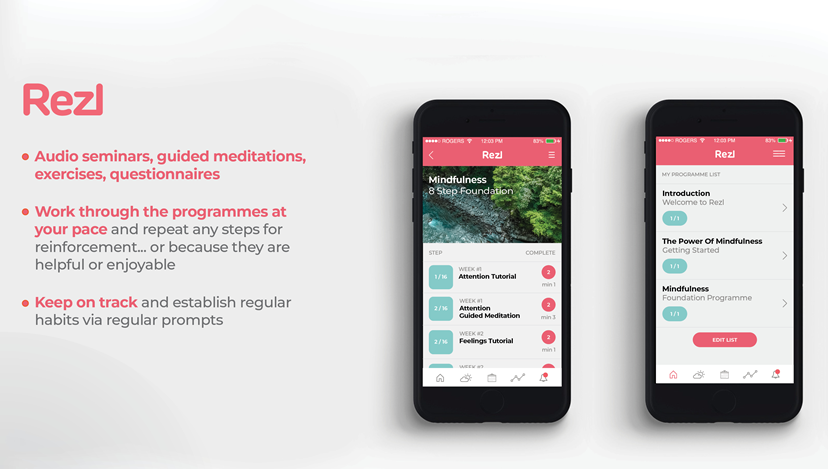Rezl Links:
Introduction – Eight Topics – Installation
Usage Guide – FAQs – Terms – Privacy
What would you like Rezl to do for you?
Just take a minute to think about what you would like to achieve from your use of Rezl. Maybe you want Rezl to:
- increase your resilience – The signs that your resilience may be getting low include difficulty sleeping, irritability and mood swings, poor levels of concentration and restlessness
- stop you from being controlled by your emotions
- help you to avoid problems like anxiety and low mood
- increase your self confidence
- help you to deal with stress and pressure
- improve your ability to concentrate and to focus
- help you to be more able to deal with the challenge and uncertainty of change.
- boost your performance at work or in sport, increase your focus, your engagement and your ‘flow’.
- enable you to develop the skills to manage in challenging and disruptive business environments and to attain the objectivity, focus and emotional stability that you will require.
So wherever you are starting from, Rezl will free you from the habits and thoughts that hold you back, and you will be able to achieve more in every part of your life. Imagine how that will feel.
Watch our short video to explain things… here

Rezl is a smartphone app designed to increase Resilience in all of us
– it’s like going to the gym, taking vitamins or eating healthily.
Rezl uses mindfulness to increase resilience to stress and to setbacks, and to reduce levels of depression and anxiety. The Rezl app has a full toolbox of audio tutorials, guided meditations and exercises.
Rezl is designed to run on iOS and Android smartphones.
Rezl allows you to work through programmes at your chosen pace, and to repeat any of the steps for reinforcement, or because you find them helpful or enjoyable.
The Rezl programmes are designed by practicing, certified therapists working with MBCT (Mindfulness Based Cognitive Therapy).
Rezl’s programmes include:
- An Introduction – explaining the background facts and statistics and how the mindfulness programme will help you to build up your resilience, together with clear instructions on how to use Rezl.
- A Mindfulness Foundation Programme – an eight stage course to enable you build up your resilience though Mindfulness Based Cognitive Therapy (MBCT) – which is scientifically proven to build up your resilience.
- The Rezl Toolbox – a set of tutorials and meditations to help you to overcome particular problems or challenges that you may face – including living with uncertainty, dealing with stress or change and avoiding sleep problems.
- A Maintenance Programme – with options for frequency and duration of use – to enable you to continue to reinforce your regular use of Rezl.
We take safeguarding very seriously, and so Rezl provides clear instructions for those who may be experiencing acute problems. Rezl provides clear advice and resources and contact information for those who feel they need help, and regular mood surveys monitor emerging risk levels and direct subjects who require individual help.
Resilience
It’s as if each of us has a kind of ‘tank of resilience’ inside ourselves – and as we encounter challenges this resilience is used up – so that when we are ‘on empty; we can no longer cope with setbacks… and that’s when we start to experience mental health issues.
Resilience is defined by the American Psychological Association:
“Resilience is the process of adapting well in the face of adversity, trauma, tragedy, threats or significant sources of stress — such as family and relationship problems, serious health problems or workplace and financial stresses. It means ‘bouncing back’ from difficult experiences.”
Research has shown that resilience is ordinary, not extraordinary. People commonly demonstrate resilience.
Being resilient does not mean that a person doesn’t experience difficulty or distress. Emotional pain and sadness are common in people who have suffered major adversity or trauma in their lives. However, resilience involves behaviours, thoughts and actions that can be learned and developed in anyone.
Mindfulness Builds Resilience
“The evidence is mounting to show that that mindfulness training can help people to cope with accumulative stress. It appears popular, feasible, acceptable… and without stigma.” – Professor Peter Jones (Neuroscience, Cambridge University)
Mindfulness is a skill to improve resilience, which allows people to deal with stresses, emotions and triggers which can cause and perpetuate episodes of anxiety and depression…
Mindfulness employs meditation and practice to enable us to be aware of our thoughts in an objective, non-judgemental way – so we are able to manage our feelings and emotions. This empowers us through a real sense of control, so that we build confidence and self-esteem.
In this way we become more resilient.
Traditionally, many people come to mindfulness to be able to focus on what is important, to reduce ‘noise’ when bombarded with messages or thoughts, to deal with stress or to find a calmness, focus or objectivity, and in recent years mindfulness has been used to train attention for the purpose of mental well-being to improve symptoms of common mental health issue such as anxiety and depression.
Evidence has shown that mindfulness really can make a significant difference to those with anxiety or depression (or both) … or those having problems related to stress… yet it can also improve the resilience within all of us, enabling each of us to be better at dealing with stress, setbacks and challenges.